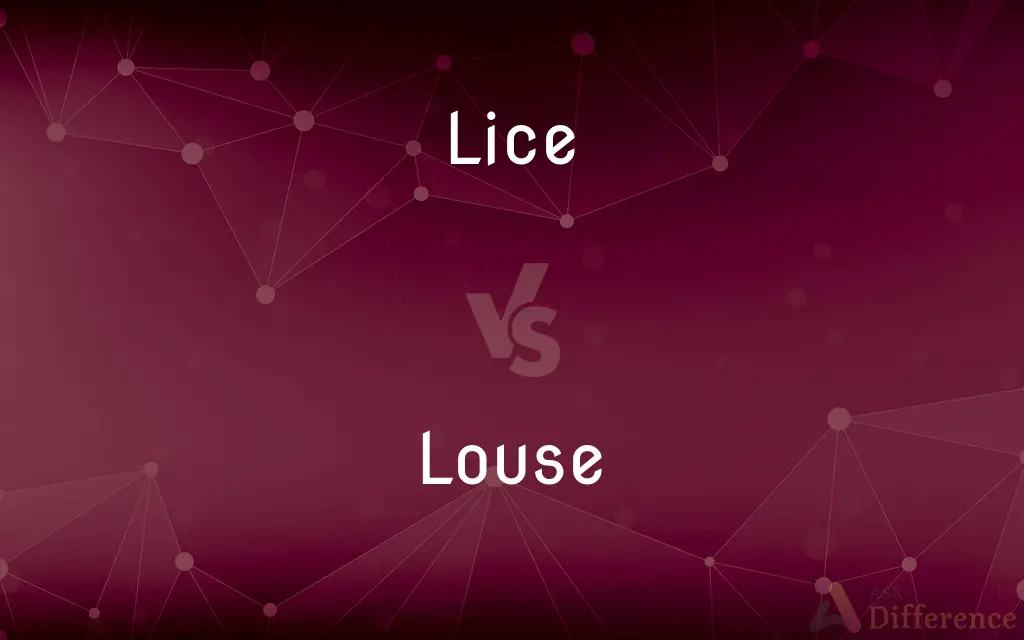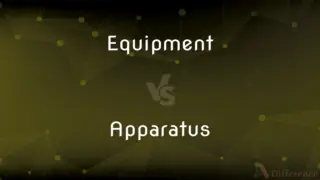Lice vs. Louse — What's the Difference?
By Maham Liaqat & Fiza Rafique — Updated on March 17, 2024
Lice are the plural form of louse, referring to parasitic insects on humans and animals, while louse is singular, indicating one such insect.

Difference Between Lice and Louse
Table of Contents
ADVERTISEMENT
Key Differences
Lice are small, wingless insects that infest the hair and skin of humans and animals, thriving by feeding on their host's blood. Whereas, a louse is a single entity of these parasites, capable of causing discomfort and health issues like itching and irritation.
Lice reproduce quickly, laying eggs called nits that attach firmly to hair strands, making them challenging to remove. On the other hand, the life cycle of a single louse begins from an egg, progresses to a nymph, and finally matures into an young, which can then continue the cycle by laying more eggs.
While lice infestations are commonly treated with specialized shampoos and combing to remove both lice and their nits, dealing with a louse involves ensuring it does not have the opportunity to multiply.
Prevention of lice is focused on avoiding direct contact with infested individuals or their belongings, whereas managing a single louse or a few of them may involve less intensive interventions, like manual removal.
Public health measures emphasize education on lice prevention and control, highlighting the importance of regular hair washing and avoiding sharing personal items like hats or brushes. In contrast, identifying and isolating a louse early can prevent a full-blown infestation.
ADVERTISEMENT
Comparison Chart
Definition
Lice are the plural form of louse, indicating multiple parasites.
Louse refers to a single parasite.
Habitat
Found in hair and on the skin, causing widespread infestation.
A single entity not indicative of widespread infestation.
Treatment
Requires thorough, often repeated, treatments to eradicate.
Isolation and removal of the individual louse.
Prevention
Involves avoiding sharing personal items and close contact.
Early detection and removal prevent proliferation.
Public Health
Focuses on widespread measures to prevent and treat infestations.
Emphasizes identifying and dealing with initial cases.
Compare with Definitions
Lice
Cause itching and discomfort through their bites.
Persistent scratching can be a sign of a lice infestation.
Louse
Capable of laying eggs, leading to an infestation.
A single louse can lay several eggs a day.
Lice
Small, wingless parasites that infest mammals and birds.
Schools often warn parents about potential lice outbreaks.
Louse
A singular term for one of the small, wingless insects parasitizing mammals and birds.
Finding a louse in your child's hair requires immediate attention.
Lice
Treated with medicated shampoos and combs.
Over-the-counter treatments for lice are widely available.
Louse
Removal often involves fine-toothed combs.
A louse can be meticulously removed using a nit comb.
Lice
Plural of louse.
Louse
Either of two small wingless parasitic insects that live on the skin of mammals and birds.
Louse
A contemptible or unpleasant person.
Louse
Spoil or ruin something
He loused up my promotion chances
Louse
Remove lice from.
Louse
Pl. lice (līs) Any of numerous small, flat-bodied, wingless biting or sucking insects of the order Phthiraptera, which live as external parasites on birds and mammals, including humans. The lice are sometimes classified together with the psocids in the order Psocodea.
Louse
Pl. lous·es (lousĭz) Slang A mean or despicable person.
Louse
To bungle. Often used with up
Louse up a deal.
Louse
A small parasitic wingless insect of the order Psocodea.
Louse
A contemptible person; one who is deceitful or causes harm.
Louse
To remove lice from; to delouse.
Louse
Any one of numerous species of small, wingless, suctorial, parasitic insects belonging to a tribe (Pediculina), now usually regarded as degraded Hemiptera. To this group belong of the lice of man and other mammals; as, the head louse of man (Pediculus capitis), the body louse (Pediculus vestimenti), and the crab louse (Phthirius pubis), and many others. See Crab louse, Dog louse, Cattle louse, etc., under Crab, Dog, etc.
Louse
Any one of numerous small mandibulate insects, mostly parasitic on birds, and feeding on the feathers. They are known as Mallophaga, or bird lice, though some occur on the hair of mammals. They are usually regarded as degraded Pseudoneuroptera. See Mallophaga.
Louse
Any one of the numerous species of aphids, or plant lice. See Aphid.
Louse
Any small crustacean parasitic on fishes. See Branchiura, and Ichthvophthira.
Louse
To clean from lice.
Louse
A person who has a nasty or unethical character undeserving of respect
Louse
Any of several small insects especially aphids that feed by sucking the juices from plants
Louse
Wingless insect with mouth parts adapted for biting; mostly parasitic on birds
Common Curiosities
What symptoms do lice cause?
Lice cause itching and discomfort, and visible nits or lice may be seen in the hair.
What environments do lice thrive in?
Lice thrive in environments where there is close human contact, such as schools and family homes.
Can a single louse cause an infestation?
Yes, a single louse can start an infestation if it is a female capable of laying eggs.
How do you treat a lice infestation?
Treating a lice infestation involves using medicated shampoos, creams, and combing out nits and lice from the hair.
How can you prevent lice?
Preventing lice involves avoiding sharing personal items and close contact with someone who has an infestation.
What are common treatments for a single louse?
A single louse can often be removed with a nit comb or by hand if detected early.
How are lice spread?
Lice are spread through direct contact with an infested person's hair or personal items like hats and brushes.
Are lice and nits the same thing?
No, lice are the live insects, while nits are their eggs attached to hair strands.
What are the differences between head lice and body lice?
Head lice live in the hair on the head, while body lice live in clothing and only move to the skin to feed.
Can pets get lice?
Yes, pets can get their own species-specific lice but cannot transfer them to humans.
Why is it important to treat lice early?
Treating lice early prevents the spread and growth of the infestation, reducing discomfort and the risk of skin infections.
How long can lice live off the human body?
Lice can survive for up to 48 hours off the human body, making it possible to spread through contaminated items.
Can lice jump from person to person?
No, lice cannot jump or fly; they spread only through direct contact.
Share Your Discovery

Previous Comparison
Private vs. Privacy
Next Comparison
Equipment vs. ApparatusAuthor Spotlight
Written by
Maham LiaqatCo-written by
Fiza RafiqueFiza Rafique is a skilled content writer at AskDifference.com, where she meticulously refines and enhances written pieces. Drawing from her vast editorial expertise, Fiza ensures clarity, accuracy, and precision in every article. Passionate about language, she continually seeks to elevate the quality of content for readers worldwide.














































